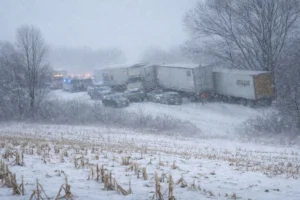Preparing for serious incidents is crucial to maintaining control over personnel and the company.
In the road transportation industry, accidents are not uncommon for drivers and agencies. These situations are often stressful and require proper handling and management, both from the employee and the employer, as well as the involved parties. Having an up-to-date insurance policy is crucial, ensuring damage is minimized, knowing relevant contact numbers, and understanding how to react to such eventualities.
Recently, the transportation portal CCJ, in collaboration with Summit Risk Solutions and Links Consulting, shared a brief guide on how to handle accidents related to truck collisions. It is essential to understand what fleets should implement when a driver is involved in a collision.

Support for truckers and employees
When a driver is involved in an accident, it is crucial for the employer to provide strong support and ensure they understand their rights and responsibilities. Additionally, if they were transporting hazardous materials, providing details to first responders is important.
Given the high tension of the moment, even the most prepared drivers may struggle to remember the proper protocols. Therefore, having simple procedures and an emergency response team available with just one call is essential.
Development of plans and policy implementation
To properly handle accident situations, more than just having a general policy is needed; detailed planning of roles and responsibilities within the team, as well as a clear action plan, are required. When crafting this plan, it is crucial to consider these key elements:
- Designate a primary point of contact for the driver, responsible for their well-being and guiding them through the process, including notifying their loved ones.
- Assign another team member to handle legal communications, with insurers and media if necessary.
- In smaller fleets, there may be one or two leaders responsible for these functions, but it is essential to clearly establish who does what.
To develop a comprehensive plan, it is advisable to seek advice from insurers, as they have experience in such situations and can ensure the plan is thorough. Preparing for serious incidents is crucial to maintaining control over personnel and the company.

Miles of love: stories of truckers and their four-legged co-pilots
The love between truckers and their pets is a strong bond, and these stories will surely warm your soul. Love manifests itself in many ways,

Cargo theft report 2025: $725 million in losses
Verisk CargoNet reports that cargo theft crime volumes remained stable, with a sharp increase in total losses. Verisk CargoNet’s 2025 report stated that the total

Ground and Air Transportation Brace for a Weekend of Cancellations and Delays
A historic cold wave is set to disrupt ground and air transportation across the United States, bringing cancellations, delays, and operational restrictions to highways, airports, and essential services throughout the weekend. Federal authorities have activated emergency plans in response to a major winter storm expected to deliver snow, ice, and extreme temperatures to large portions of the country.

Geopolitical tensions and the dispute between Trump and the Federal Reserve
The United States is going through a complex geopolitical environment along with internal tensions between President Donald Trump and the Federal Reserve. In the latest

Polar Vortex Puts U.S. Roads on Alert
A powerful polar vortex outbreak is triggering a widespread winter storm across the United States, bringing snow, ice, and extreme cold to major freight corridors. The event poses a serious risk to trucking operations, road safety, delivery schedules, and commercial vehicle insurance exposure.

DOT unveils possible AI strategy to enforce CDL regulations
The DOT is looking to adopt AI and advanced data analytics to improve the accuracy and effectiveness of enforcement measures. On January 14, the 105th
